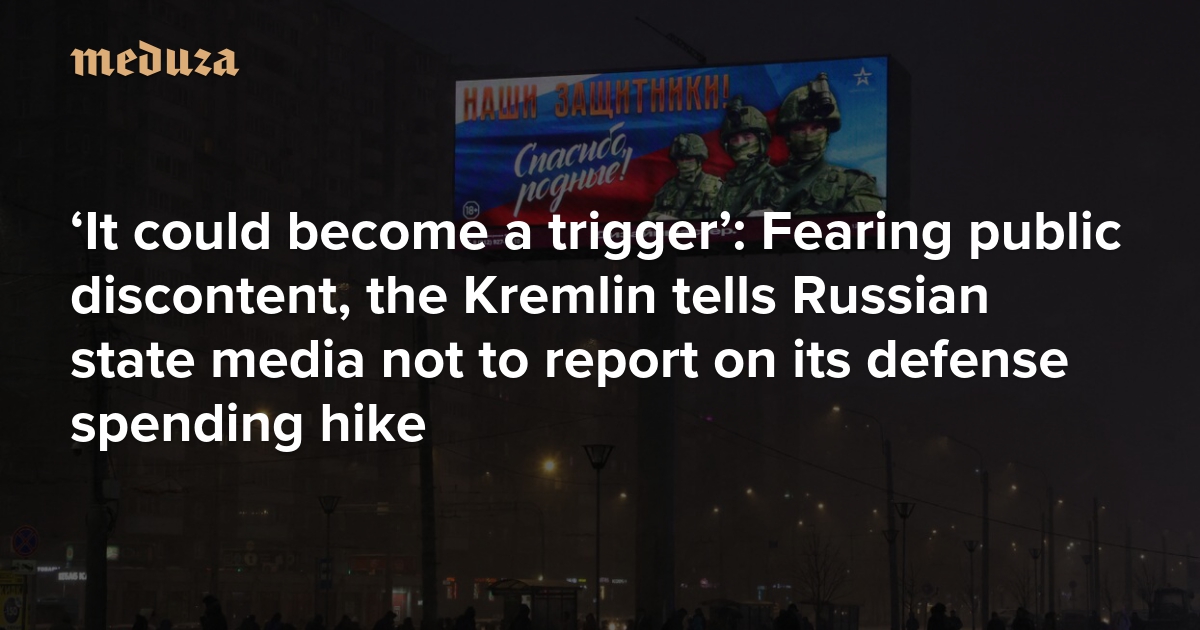cross-posted from: https://feddit.org/post/3446962
In late September, the Russian government submitted a draft budget for 2025–2027 to the State Duma for approval. The plan calls for a record-setting 41 percent of federal spending to go to national security and defense, leaving little doubt that the war in Ukraine is the Kremlin’s top priority. With many citizens struggling economically amid ongoing inflation and labor shortages, however, the Putin administration fears that news of a military spending boost will hurt the authorities’ approval ratings — and has instructed the pro-Kremlin media to cover the budget accordingly, Meduza’s sources say.
The Putin administration is worried the government’s new budget will “create a negative perception among citizens” and could lead to a decline in the government’s approval ratings, two sources close to the president’s political team told Meduza.
Immediately after Bloomberg published an article on the planned defense spending increase on September 23, the Putin administration sent instructions to Russia’s state-backed and pro-Kremlin media telling them to ignore the report, the sources said. Two sources from these media outlets confirmed this to Meduza; one said that officials told reporters “not to touch this topic” because “the budget hasn’t been passed yet.”
[…]
According to another source close to the president’s team, the Kremlin wants media coverage of the budget to inspire “social optimism, not pessimism, in the context that everything is going towards the war.” The source continued: “The messaging around the special military operation’s goals is still unclear. So far, it’s been possible to portray military activity as happening somewhere far away and not affecting people directly. But the increase in military spending could become a trigger: What is the money being spent on and why?”
[…]



We’re probably going to have to bump our own aid as well, unless we’re confident of an asymmetric counter to whatever Russia’s doing with her funds (e.g. building munitions factory == strike on munitions factory).
I did read an article discussing that the US should be on firmer ground than last year politically on funds:
https://www.atlanticcouncil.org/blogs/ukrainealert/the-united-states-needs-a-long-term-approach-to-ukraine-aid/
To be fair, Russia is running out of Soviet era weapons, so we are probably still outpacing them in the long run. But Ukraine needs all the help they can get. Military spending there is like 40% of GDP while Russia is only 10-20% or so.
https://www.reuters.com/world/europe/russia-hikes-national-defence-spending-by-23-2025-2024-09-30/
I mean, Russia has a benefit going away in the form of the Soviet weapons inventory, but we sent something like $62 billion to Ukraine in 2024. IIRC US-originating aid is on the order of half of what Ukraine got. Note that not all of this is grants, either…on the EU side, I believe that a considerable amount is loans on generous terms. I don’t know whether those might be forgiven or something, whether doing it as a “loan” might be to help make it more-palatable to EU voters, but point is, it may be less than the up-front number. Also, a lot of US aid is in military aid, which may not be in a form as ideal to Ukraine as simply cash; cash could be used to purchase anything, which may-or-may-not be exactly the military hardware that’s provided. Russia’s getting cash that can be used to purchase whatever (well, okay, within the constraints imposed by sanctions).
But my broader point is, if Russia’s putting more resources into the conflict, we may well need to be willing to counter that.
Also, keep in mind that some of those funds need to go to things like dealing with economic impact. Russia mostly has electrical power. Ukraine has lost something like 80% of their electrical output. That shuts down some of what Ukraine could be doing. If Ukraine cannot build something they need because an industry lacks electricity, then they need to import it, and that requires funds. Like, we can send a shit-ton of small generators and fuel to help offset that, but that costs something.
And that a fair amount of what Ukraine is doing is air defense, and at least as things stand – a point that I saw just raised with the Israel/Iran missile issue – it’s generally cheaper to build something to throw something that explodes at the other guy than it is to build something that stops it before it hits.